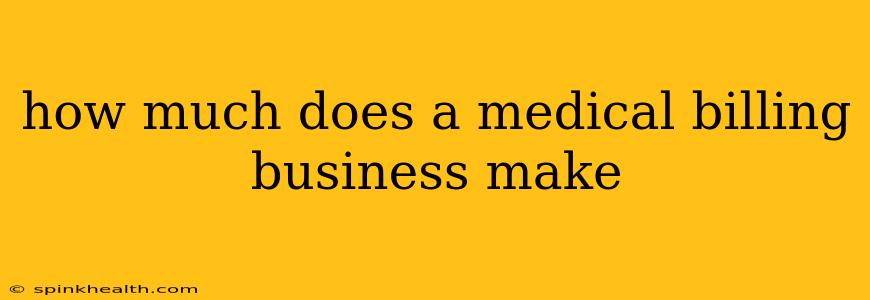How Much Does a Medical Billing Business Make? Unraveling the Financials of Healthcare Revenue Cycle Management
The question, "How much does a medical billing business make?" is a siren song in the entrepreneurial world. The allure of a thriving business in the ever-expanding healthcare sector is undeniable, but the reality is far more nuanced than a single dollar figure. Profits in medical billing aren't simply plucked from the air; they're the result of hard work, strategic planning, and a deep understanding of the intricate revenue cycle management (RCM) process.
Let's embark on a journey to understand the financial landscape of medical billing businesses, tackling the variables that influence profitability and uncovering the secrets to success.
What Factors Determine a Medical Billing Business's Income?
The income of a medical billing business is a complex equation with many variables:
-
Business Model: Are you a solopreneur operating from home, a small team serving a niche clientele, or a larger company handling billing for a network of medical practices? Your scale directly impacts revenue potential.
-
Client Base: The type and size of clients dramatically affect income. A single, large hospital system can generate significantly more revenue than many smaller physician practices. Specializing in a specific medical niche (e.g., dermatology, cardiology) can also affect pricing and profitability.
-
Pricing Strategy: Do you charge a flat fee per claim, a percentage of collected revenue, or a hybrid model? The pricing structure must be carefully calibrated to cover expenses and deliver a reasonable profit margin while remaining competitive.
-
Efficiency and Technology: A streamlined workflow leveraging advanced billing software and electronic health records (EHR) systems can dramatically reduce costs and increase efficiency, ultimately boosting profitability. Manual processes are time-consuming and error-prone, impacting the bottom line.
-
Negotiation Skills: Securing favorable contracts with insurance providers is crucial for maximizing reimbursement rates. Strong negotiation skills are essential for a thriving medical billing business.
-
Staffing and Overhead Costs: Salaries, rent, software licenses, and other overhead expenses will directly affect your net profit. Managing costs efficiently is paramount.
What are the typical expenses of a medical billing company?
Understanding the expense side of the equation is equally critical to gauging profitability.
- Staff Salaries: This can range from a single employee's salary to a team of coders, billers, and administrative staff.
- Software and Technology: Medical billing software, EHR integration, and other technological tools are essential.
- Office Space and Utilities: Rent, utilities, and other overhead costs associated with physical office space (or home office expenses).
- Marketing and Sales: Costs associated with acquiring new clients, including marketing materials, networking events, and online advertising.
- Professional Services: Consulting fees, legal expenses, or accounting services.
- Insurance and Taxes: Various business-related insurance and tax obligations.
What is the average profit margin for a medical billing company?
There’s no single answer to this. Profit margins vary wildly, influenced by all the factors mentioned above. While some smaller, newly established businesses might operate on tighter margins, larger, established companies with efficient processes and lucrative contracts might boast higher profit margins.
Profit margins can range from single digits to double digits, depending on the business model, client base, and operational efficiency. Industry reports and financial data from companies specializing in medical billing services can provide benchmarks, but these are only indicative.
How can I increase the profitability of my medical billing business?
To enhance profitability, focus on these key areas:
- Invest in technology: Automation and efficient software can significantly reduce errors and costs.
- Streamline processes: Identify bottlenecks in your workflow and optimize them for maximum efficiency.
- Negotiate favorable contracts: Secure high reimbursement rates with insurance providers.
- Improve client relationships: Retain existing clients and actively seek new opportunities.
- Specialize in a niche market: Focus on a specific medical area to become an expert in that field.
- Develop strong marketing strategies: Effectively promote your services and build a strong reputation.
- Invest in employee training: Ensure your staff has the skills and knowledge to perform effectively.
In conclusion, the earning potential of a medical billing business is highly variable. It's a complex undertaking requiring expertise, strategic planning, and relentless attention to detail. Success hinges on building a robust infrastructure, cultivating strong client relationships, and efficiently managing resources while staying updated on the ever-evolving healthcare landscape. Don't chase a single magic number—instead, focus on building a sustainable and profitable business based on sound principles and efficient practices.

